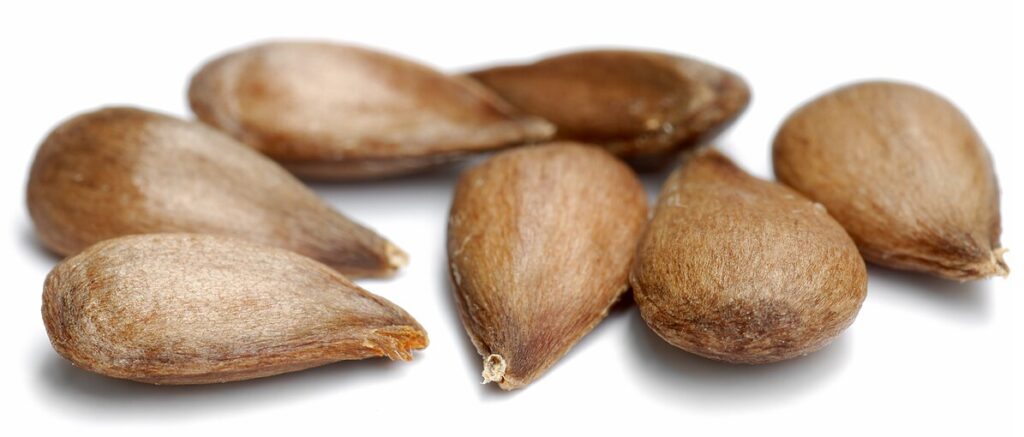Apple seeds, often overlooked in discussions about fruit nutrition, have been recognized in both traditional and modern medicine for their potential health benefits. While the seeds of apples grown worldwide share many similarities, Asian apple seeds have garnered particular attention due to their distinct varieties and potential cardiovascular health benefits. In this article, we will explore how Asian apple seeds may contribute to heart health, backed by their nutritional content, antioxidant properties, and other bioactive compounds.
Nutritional Profile of Asian Apple Seeds
Before delving into the specific cardiovascular benefits, it’s important to understand the nutritional content of apple seeds. Although they are small and hard, apple seeds, including those from Asian apple varieties, contain several bioactive compounds and nutrients that can influence cardiovascular health.
- Antioxidants: Apple seeds are rich in antioxidants, particularly flavonoids, phenolic compounds, and vitamin E. These antioxidants help neutralize free radicals in the body, reducing oxidative stress, which is a major contributor to cardiovascular disease. By reducing the oxidative damage to blood vessels and heart tissues, antioxidants support overall heart health.
- Healthy Fats: Like many seeds, apple seeds contain small amounts of healthy fats, particularly unsaturated fatty acids, which are essential for maintaining healthy cholesterol levels. A balanced intake of healthy fats can help regulate blood lipid profiles, lowering the risk of heart disease.
- Fiber: Apple seeds provide some dietary fiber, which is known to support heart health by improving cholesterol levels and promoting healthy digestion. Fiber helps in the reduction of LDL (“bad”) cholesterol levels in the bloodstream, thereby decreasing the risk of plaque buildup in the arteries.
- Minerals: Essential minerals like potassium, magnesium, and calcium found in apple seeds play a vital role in maintaining normal blood pressure, supporting proper heart function, and contributing to overall cardiovascular health.
Antioxidant Properties and Their Impact on Cardiovascular Health
One of the most significant ways in which Asian apple seeds contribute to heart health is through their antioxidant properties. Oxidative stress, caused by an imbalance between free radicals and antioxidants in the body, has been linked to various cardiovascular diseases, including atherosclerosis, heart attacks, and stroke.
The antioxidants in apple seeds—especially flavonoids and phenolic acids—help reduce oxidative damage by neutralizing free radicals. These antioxidants also support the repair of damaged tissues in the blood vessels, improving blood flow and reducing inflammation in the cardiovascular system. In essence, consuming apple seeds in moderation may help protect the heart from the long-term effects of oxidative stress, lowering the risk of developing cardiovascular conditions.
Amygdalin and Its Potential Cardiovascular Effects
Amygdalin, a cyanogenic glycoside found in apple seeds, has been a topic of significant research. While amygdalin has gained notoriety due to its potential to release cyanide when metabolized, it also has other health-promoting effects. Some studies suggest that amygdalin may have anti-inflammatory properties, which could be beneficial for heart health.
Inflammation plays a key role in the development of cardiovascular diseases, including atherosclerosis, where the blood vessels become clogged with plaque. By reducing inflammation, amygdalin could help protect blood vessels and reduce the risk of cardiovascular disease. However, more research is needed to understand the exact role of amygdalin in cardiovascular health, as its toxicity at high doses remains a concern.
Promoting Healthy Cholesterol Levels
Apple seeds may also help in managing cholesterol levels, which is crucial for maintaining heart health. The fiber in apple seeds plays a key role in reducing LDL cholesterol (often referred to as “bad” cholesterol), which is a major risk factor for heart disease. By binding to cholesterol in the digestive tract and helping it pass through the body, fiber prevents the buildup of plaque in the arteries.
Moreover, the unsaturated fats present in apple seeds support the regulation of blood lipids, further aiding in the reduction of unhealthy cholesterol levels. These healthy fats can help raise HDL cholesterol (the “good” cholesterol) levels, which help remove excess cholesterol from the bloodstream and protect against cardiovascular disease.
Blood Pressure Regulation

Another key factor in cardiovascular health is blood pressure. High blood pressure (hypertension) is a significant risk factor for heart disease and stroke. Apple seeds contain minerals like potassium and magnesium, which play an essential role in regulating blood pressure.
- Potassium helps balance the effects of sodium in the body, preventing blood pressure from rising. It also helps relax blood vessel walls, improving blood flow and reducing strain on the heart.
- Magnesium supports the function of blood vessels and helps maintain a normal heart rhythm. Magnesium deficiency has been linked to an increased risk of high blood pressure and cardiovascular disease.
By consuming apple seeds in moderation, you may help your body achieve a better balance of these vital minerals, thereby supporting healthy blood pressure levels and promoting cardiovascular wellness.
Anti-Inflammatory Effects and Protection Against Atherosclerosis
Inflammation in the blood vessels is one of the primary drivers of atherosclerosis, a condition where plaque builds up in the arteries, restricting blood flow and increasing the risk of heart attack and stroke. Apple seeds contain anti-inflammatory compounds, including antioxidants and potential benefits from amygdalin, which may help mitigate this inflammation.
Chronic inflammation is often a result of oxidative stress, but the anti-inflammatory compounds in apple seeds can reduce the levels of harmful substances in the blood vessels. This, in turn, may slow down or prevent the progression of atherosclerosis, keeping the arteries clear and ensuring optimal heart health.
Caution: The Importance of Moderation
While the potential cardiovascular benefits of apple seeds are intriguing, it is crucial to consume them in moderation. The presence of amygdalin, which can release cyanide when metabolized, makes excessive consumption of apple seeds dangerous. A small number of seeds, especially when consumed whole and uncrushed, are generally considered safe for most individuals. However, eating large quantities or chewing the seeds could release harmful compounds and pose a risk to health.
For those interested in the health benefits of apple seeds, it is recommended to consume only a few seeds at a time or use them in small amounts as part of a broader diet that includes other heart-healthy foods.
Conclusion
Asian apple seeds may offer several cardiovascular benefits, primarily through their antioxidant properties, fiber content, and essential minerals like potassium and magnesium. These compounds help improve heart health by reducing oxidative stress, promoting healthy cholesterol levels, regulating blood pressure, and supporting the overall function of the cardiovascular system.
However, while the benefits are promising, it’s important to consume apple seeds with caution due to the presence of amygdalin. Moderation is key, and it’s always a good idea to consult a healthcare professional before incorporating apple seeds into your diet for medicinal purposes.
Incorporating apple seeds into your diet in small, controlled amounts, alongside a balanced diet rich in fruits, vegetables, and whole grains, may contribute to better heart health and a reduced risk of cardiovascular diseases.



